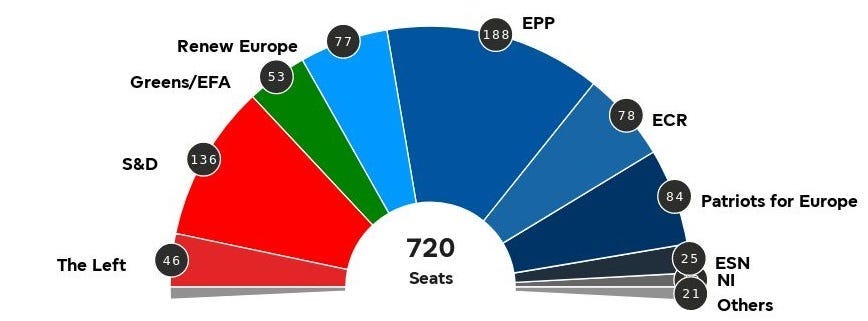Ursula's risky gambit
Though a deal with the Greens might have been the surest way to avoid an unsure confirmation vote on Thursday, President von der Leyen has chosen instead to hope for support from the hard right.
I’m in Strasbourg this week, where this morning members of the European Parliament voted overwhelmingly at the opening session of the new 2024-2029 term to re-elect Roberta Metsola as their speaker. The center-right Maltese MEP, well-liked across the parliament’s various political groups, won 80% of votes from MEPs in the chamber, with approximately 10% abstaining and 10% voting for a quixotic far-left candidate. It is the largest majority for an EP speaker vote in the institution’s history. Could it be a good sign for Thursday’s confirmation vote on whether to give center-right Commission President Ursula von der Leyen a second term?
The stakes are high, because if von der Leyen is rejected she doesn’t get a second chance. Once the parliament rejects a candidate, convention dictates that the Council must send them a new one. Last time in 2019, exactly five years ago today, von der Leyen survived her confirmation vote by just nine votes. The circumstances were quite different back then, because MEPs were protesting the Council’s rejection of the democratic spitzenkandidat process to field presidential candidates during the EU election. But the central problem remains the same: for reasons that I still don’t understand, this is a secret ballot. And even when her deal with the centrist coalition (center-left S&D, liberal Renew and her own center-right EPP) should easily give her the numbers for confirmation, there’s always the risk of unforeseen secret defections (the possibility of which has been helpfully calculated here). And in that instance, she’ll need the security of some MEPs from other groups to cancel those defections out.
Von der Leyen will need at least 361 of the parliament’s 720 members to vote for her. The centrist coalition together have 401 seats. While that would be a comfortable majority in a whipped vote, in a secret ballot anything below a 10% cushion is considered risky. During the campaign, von der Leyen made entreaties toward Giorgia Meloni’s far-right ECR group, in the end they did not secure enough votes to make a right-wing EPP-ECR (with other far right groups) controlling coalition possible. The center held. The far right, which had disappointing results outside of Germany, France and Italy, has defied predictions of being a kingmaker and instead split into three groups, each led by MEPs from one of the ‘big three’ countries, and they look primed for irrelevance in this term.
Nevertheless, the president can still count on some votes from the least-far-right of the three groups, ECR. The problem is that she has promised S&D and Renew that she will not make any formal agreement with ECR, otherwise she will lose their support and be guaranteed rejection. So at her meeting with ECR this morning, which she called an “intense hour”, she was walking a tightrope. She couldn’t make any outright promises to them or she risks losing the core of her confirmation vote. But if she doesn’t convince at least some of them to vote for her, she could be in trouble. Following the meeting, it looks like she has secured the votes of ECR member parties ODS (Czechia) and NVA (Belgium), but that’s not many MEPs. Polish PiS say they will vote against her, and we still don’t know how Meloni’s FdI will vote. Meloni refused to vote for von der Leyen’s appointment at the European Council summit last month, the first time Italy hasn’t supported a president.
What has left some people scratching their heads is why von der Leyen didn’t make a deal with the Greens. While S&D and Renew promised to reject her if she made a deal with ECR, the EPP made no such threat about her making a deal with the Greens (which surprised me, given how much EPP MEPs have been railing against the Green Deal). She could have used the opportunity to recommit to the Green Deal, her signature policy that the EPP made her back away from during the campaign. She c could have offered the Greens specific commitments on implementation, secondary legislation and future proposals. But she didn’t. And so while some Green MEPs will surely vote for her, there is no group commitment to do so. Such a commitment would have made Thursday’s vote much more of a sure thing. It’s inconceivable that many EPP MEPs would have secretly defected if she made a deal with the Greens.
In the end, von der Leyen appears to be banking on anxiety to be the motivating factor in securing her confirmation. MEPs know that rejecting her will throw the EU into chaos, at a time when the union can least afford it. With many here in Europe now seeing a Trump restoration as an inevitably following the assassination attempt this weekend, these will be a critical five months to prepare. A rejection this week will mean the European Council will have to call an emergency summit in August to select a new name (by the way, many expect that in this scenario that new name would be Metsola). The whole top jobs package could be thrown out of whack, with new names possibly having to be selected for European Council chairman and EU high representative for foreign affairs.
In the end, I think it is unlikely that MEPs will vote to reject von der Leyen on Thursday at 1pm (the result will be announced at 2:45). But I’ve talked to several MEPs or their assistants in Strasbourg who say they have the same expectation, yet they say they will vote against her. If everyone assumes she’ll be fine in the end, and they are free to vote with their conscience, that could spell trouble. It does seem there will be enough Green and ECR votes to balance out any centrist defectors. But we won’t know for sure until Thursday afternoon.





